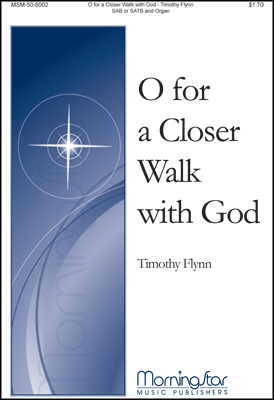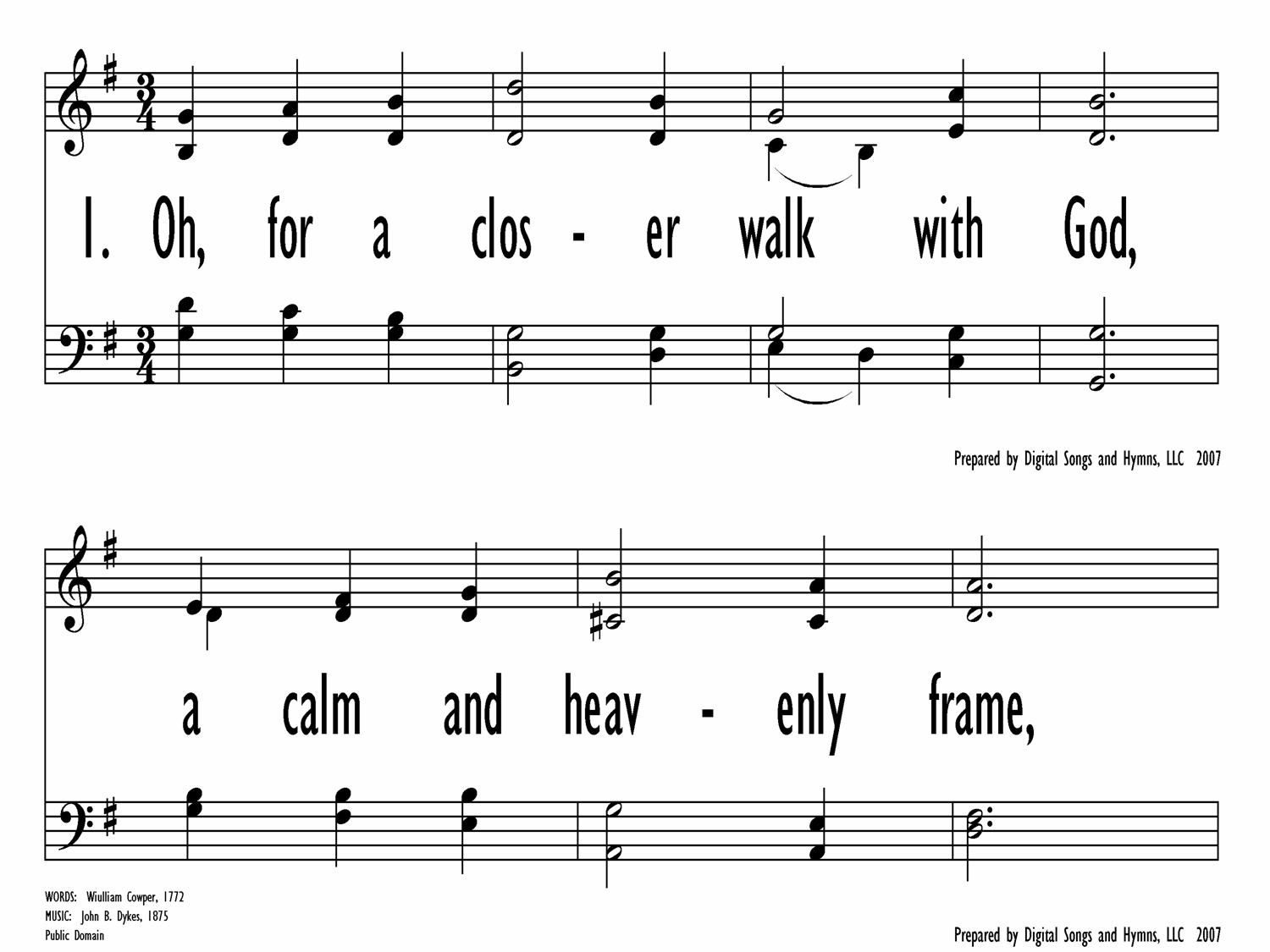- |
User Links
Walking with God

O! for a closer walk with God
Author: William Cowper (1772)Published in 1376 hymnals
Printable scores: PDF, MusicXMLPlayable presentation: Lyrics only, lyrics + musicAudio files: MIDI, Recording
Representative Text
1 O for a closer walk with God,
a calm and heav'nly frame,
a light to shine upon the road
that leads me to the Lamb!
2 Where is the blessedness I knew
when first I sought the Lord?
Where is the soul refreshing view
of Jesus and His Word?
3 What peaceful hours I then enjoyed!
How sweet their mem'ry still!
But they have left an aching void
the world can never fill.
4 Return, O holy Dove, return,
sweet messenger of rest;
I hate the sins that made Thee mourn,
and drove Thee from my breast.
5 The dearest idol I have known,
whate'er that idol be,
help me to tear it from Thy throne
and worship only Thee.
6 So shall my walk be close with God,
calm and serene my frame;
so purer light shall mark the road
that leads me to the Lamb.
Source: Psalms and Hymns to the Living God #358
Author: William Cowper
 William Cowper (pronounced "Cooper"; b. Berkampstead, Hertfordshire, England, 1731; d. East Dereham, Norfolk, England, 1800) is regarded as one of the best early Romantic poets. To biographers he is also known as "mad Cowper." His literary talents produced some of the finest English hymn texts, but his chronic depression accounts for the somber tone of many of those texts. Educated to become an attorney, Cowper was called to the bar in 1754 but never practiced law. In 1763 he had the opportunity to become a clerk for the House of Lords, but the dread of the required public examination triggered his tendency to depression, and he attempted suicide. His subsequent hospitalization and friendship with Morley and Mary Unwin provided emotional st… Go to person page >
William Cowper (pronounced "Cooper"; b. Berkampstead, Hertfordshire, England, 1731; d. East Dereham, Norfolk, England, 1800) is regarded as one of the best early Romantic poets. To biographers he is also known as "mad Cowper." His literary talents produced some of the finest English hymn texts, but his chronic depression accounts for the somber tone of many of those texts. Educated to become an attorney, Cowper was called to the bar in 1754 but never practiced law. In 1763 he had the opportunity to become a clerk for the House of Lords, but the dread of the required public examination triggered his tendency to depression, and he attempted suicide. His subsequent hospitalization and friendship with Morley and Mary Unwin provided emotional st… Go to person page >Text Information
| First Line: | O! for a closer walk with God |
| Title: | Walking with God |
| Author: | William Cowper (1772) |
| Meter: | 8.6.8.6 |
| Source: | |
| Language: | English |
| Copyright: | Public Domain |
- (hymns)
- (hymns)
- (hymns)
- (hymns)
- (hymns)
- (hymns)
- (hymns)
- (hymns)
- (hymns)
- (hymns)
- (hymns)
- (hymns)
- (hymns)
- (hymns)
- (hymns)
- (hymns)
- (hymns)
- (hymns)
- (hymns)
- (hymns)
- (hymns)
- (hymns)
- (hymns)
- (hymns)
- (hymns)
- (hymns)
- (hymns)
- (hymns)
- (hymns)
- (hymns)
- (hymns)
- (hymns)
- (hymns)
- (hymns)
- (hymns)
- (hymns)
- (hymns)
- (hymns)
- (hymns)
- (hymns)
- (hymns)
- (hymns)
- (hymns)
- (hymns)
- (hymns)
- (hymns)
- (hymns)
- (hymns)
- (hymns)
- (hymns)
- (hymns)
- (hymns)
- (hymns)
- (hymns)
- (hymns)
- (hymns)
- Year A, Epiphany Season, Fourth Sunday
This is recommended for Year A, Epiphany Season, Fourth Sunday by 2 hymnal lectionary indexes including Glory to God: the Presbyterian Hymnal #739 and Lift Up Your Hearts: psalms, hymns, and spiritual songs #324. - Year A, Lent, Ash Wednesday
This is recommended for Year A, Lent, Ash Wednesday by 2 hymnal lectionary indexes including Glory to God: the Presbyterian Hymnal #739 and Lift Up Your Hearts: psalms, hymns, and spiritual songs #324. - Year A, Ordinary Time, Proper 23 (28)
This is recommended for Year A, Ordinary Time, Proper 23 (28) by 2 hymnal lectionary indexes including Glory to God: the Presbyterian Hymnal #739 and Lift Up Your Hearts: psalms, hymns, and spiritual songs #324. - Year B, Lent, Ash Wednesday
This is recommended for Year B, Lent, Ash Wednesday by 2 hymnal lectionary indexes including Glory to God: the Presbyterian Hymnal #739 and Lift Up Your Hearts: psalms, hymns, and spiritual songs #324. - Year C, Lent, Ash Wednesday
This is recommended for Year C, Lent, Ash Wednesday by 2 hymnal lectionary indexes including Glory to God: the Presbyterian Hymnal #739 and Lift Up Your Hearts: psalms, hymns, and spiritual songs #324. - Year C, Lent, Third Sunday
This is recommended for Year C, Lent, Third Sunday by 2 hymnal lectionary indexes including Glory to God: the Presbyterian Hymnal #739 and Lift Up Your Hearts: psalms, hymns, and spiritual songs #324.
English
- 52 Hymns of the Heart: with an appendix of favorite solos and choruses (Missionary and Church Extension Ed.) #33
- A Baptist Hymn Book, Designed Especially for the Regular Baptist Church and All Lovers of Truth #d558
- A Book of Worship for the Use of the Evangelical Lutheran Church ... of the Church of the Redeemer, Richmond, Virginia #d121
- A Choice Collection of Hymns, and Spiritual Songs, designed for the devotions of Israel, in prayer, conference, and camp-meetings...(2nd ed.) #57
- A Choice Collection of Hymns, in which are some never before printed #XLIX
- A Choice Selection of Evangelical Hymns, from various authors: for the use of the English Evangelical Lutheran Church in New York #183
- A Choice Selection of Hymns and Spiritual Songs for the use of the Baptist Church and all lovers of song #44
- A Choice Selection of Hymns. 6th ed. #d186
- A Choice Selection of Psalms, Hymns and Spiritual Songs for the use of Christians #420
- A Chord #d78 10 shown out of 861
German
Notes
Scripture References:
st. 3-4 = Ps. 51:12, Job 29:2-3
st. 5 = Heb. 12:14
William Cowper (PHH 434) wrote this text on December 9, 1769, during the illness of his long-time friend and housekeeper, Mrs. Unwin. In a letter written the next day Cowper voiced his anxieties about her condition and about what might happen to him if she died. Saying that he composed the text "to surrender up to the Lord" all his "dearest comforts," Cowper added,
Her illness has been a sharp trial to me. Oh, that it may have a sanctifying effect!. . . I began to compose the verses yesterday morning before daybreak, but fell asleep at the end of the first two lines; when I awoke again, the third and fourth were whispered to my heart in a way which I have often experienced.
The text was published in Richard Conyers's Collection of Psalms and Hymns (1772) and, with some revision, in the Olney Hymns (1779). There it had the heading "Walk with God" and included a reference to Enoch in Genesis 5:24. The original fourth stanza is omitted.
Although Cowper frequently battled depression, doubt, and melancholy, this text speaks of a very intimate walk with the Lord. That walk is rooted in Scripture (st. 1), rejoices in conversion (st. 2-3), and denounces all idols that would usurp God's sovereignty (st. 4). The text concludes with a return to the prayer of the first stanza, but now that prayer is sung with increased confidence and serenity.
Liturgical Use:
For occasions of aspiration, hope, and encouragement for a more intimate walk with God; a fine testimonial hymn.
--Psalter Hymnal Handbook
===========================
O for a closer walk with God. W. Cowper. [Walking with God.] This is one of the most beautiful, tender, and popular of Cowper's hymns. It appeared in the 2nd edition of R. Conyers's Collection of Psalms & Hymns, 1772, in 6 stanzas of 4 lines, and again in A. M. Toplady's Psalms & Hymns, 1776, and in the Olney Hymns, 1779, Book i., No. 3, and headed, "Walking with God." It is based on Gen. v. 24, "And Enoch walked with God." It is in extensive use in all English-speaking countries, and usually in its original form.
--John Julian, Dictionary of Hymnology (1907)
====================
O for a closer walk with God , p. 829, ii. In Notes and Queries , July 30, 1904, in one of a series of the poet Cowper's hitherto un¬published letters, under date of Olney, Dec. 10, 1769, after referring to the serious illness of his friend and companion, Mrs. Unwin, in words of great beauty and tenderness, he adds:—
“When I consider the great meetness to which the Lord has wrought her for the inheritance in light; her most exemplary patience under the sharpest sufferings; her truly Christian humility and resignation; I am more than ever inclined to believe that her hour has come. Let me engage your prayers for her and for me. You know what I have most need of upon an occasion like this. Pray that I may receive it at His hands, from whom every good and perfect gift cometh. She is the chief of blessings I have met with in my journey, since the Lord was pleased to call me, and 1 hope the influence of her edifying and excellent example will never leave me. Her illness has been a sharp trial to me. Oh! that it may have a sanctified effect, that I may rejoice to surrender up to the Lord my dearest comforts, the moment He shall require them. Oh! for no will but the will of my Heavenly Father!
"I return you thanks for the verses you sent me, which speak sweetly the language of a Christian soul. I wish I could pay you in kind ; but must be contented to pay you in the best kind I can. I began to compose them yesterday morning [Dec. 9, 1769], before daybreak, but fell asleep at the end of the first two lines: when I awaked again, the third and fourth were whispered to my heart in a way which I have often experienced:—"Oh for a closer walk with God
A calm and Heavenly frame,
A light to shine upon the road.
That leads me to the Lamb."[Here follow the remaining five stanzas of the hymn, and the letter concludes:] "l am yours, my dear Aunt, in the bands of that Love which cannot be quenched, &c.
“W. C."
The light which this letter throws upon the hymn is intense and searching. We read a new and pathetically personal history and meaning in the earnest and throbbing lines, and are brought face to face with an agony which would have been voiceless but for the mercy and goodness of God.
--John Julian, Dictionary of Hymnology, New Supplement (1907)
Tune
BEATITUDOComposed by John B. Dykes (PHH 147), BEATITUDO was published in the revised edition of Hymns Ancient and Modern (1875), where it was set to Isaac Watts' "How Bright Those Glorious Spirits Shine." Originally a word coined by Cicero, BEATITUDO means "the condition of blessedness." Like many of Dykes's…
ORTONVILLE
Timeline
Arrangements
Media
- MIDI file from The Cyber Hymnal #4816
- MIDI file from Gloria Deo: a Collection of Hymns and Tunes for Public Worship in all Departments of the Church #119
- Audio recording from Glory to God: the Presbyterian Hymnal #739
- Audio recording from Lift Up Your Hearts: psalms, hymns, and spiritual songs #324
- MIDI file from Psalter Hymnal (Gray) #551
- MIDI file from Psalter Hymnal (Gray) #551
- MIDI file from The Southern Harmony, and Musical Companion (New ed. thoroughly rev. and much enl.) #300


 My Starred Hymns
My Starred Hymns





